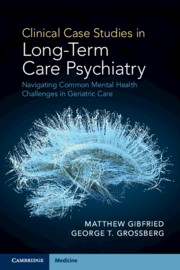 Clinical Case Studies in Long-Term Care Psychiatry
Clinical Case Studies in Long-Term Care Psychiatry Bipolar Disorder
Published online by Cambridge University Press: 31 October 2024
Bipolar disorder is a condition that is commonly encountered in the older adult population. Estimates are that up to 4.5% of adults in the US are affected by bipolar disorder. The estimates for older adults are between 0.5 and 1%. Starting a mood stabilizer or second-generation antipsychotic is a good first choice for those who are depressed with a known personal history of bipolar disorder and who are not already on one. It is important for healthcare providers in long-term care settings to recognize early signs of psychiatric destabilization in those with bipolar disorder. Signs of destabilization in older adults can be decreased need for sleep, increased irritability, a general increase in activity, or even the development of psychosis (delusions or hallucinations).
To save this book to your Kindle, first ensure no-reply@cambridge.org is added to your Approved Personal Document E-mail List under your Personal Document Settings on the Manage Your Content and Devices page of your Amazon account. Then enter the ‘name’ part of your Kindle email address below. Find out more about saving to your Kindle.
Note you can select to save to either the @free.kindle.com or @kindle.com variations. ‘@free.kindle.com’ emails are free but can only be saved to your device when it is connected to wi-fi. ‘@kindle.com’ emails can be delivered even when you are not connected to wi-fi, but note that service fees apply.
Find out more about the Kindle Personal Document Service.
To save content items to your account, please confirm that you agree to abide by our usage policies. If this is the first time you use this feature, you will be asked to authorise Cambridge Core to connect with your account. Find out more about saving content to Dropbox.
To save content items to your account, please confirm that you agree to abide by our usage policies. If this is the first time you use this feature, you will be asked to authorise Cambridge Core to connect with your account. Find out more about saving content to Google Drive.